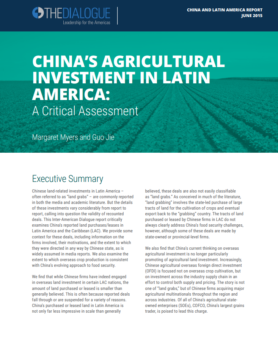The Nationalism of Cristina Fernández de Kirchner
Argentine President Cristina Fernández has increased her appeals to nationalist sentiment to build domestic political support.
A Daily Publication of The Dialogue
Argentina’s national labor appeals court on Jan. 3 temporarily suspended a series of labor reforms that President Javier Milei decreed last month. The court said the labor reforms, including measures on dismissal terms and severance pay- ments, were halted until it could rule on whether they could be enacted without the approval of Congress. The changes were part of a “mega decree” that included more than 300 measures to deregulate Argentina’s economy. What does Milei want to accomplish with the labor reforms, and how would they affect workers and Argentina’s economy? What chance do the changes have at being put back into force? What other parts of Milei’s “mega decree” are the most significant, and what will be their effects?
Carolina Costa, head of Latin America government affairs and multilateral engagement at RELX: “A libertarian economist, President Milei attracted popularity during his campaign by advocating deep public spending cuts and shock economic reforms. As such, the Dec. 20 announcement of the ‘mega decree’ (or ‘decretazo’), which would alter or discard more than 350 economic regulations, including many changes to existing labor provisions, came as no surprise. And, in a country prone to heavy state interventionism, the social backlash against the decree, combined with the decision issued by the National Chamber of Labor Appeals granting the National Confederation of Labor, Argentina’s powerful trade union group center, its request for suspension of the effects of the labor reform provided in the mega decree, also was to be expected. And while the matter is now under review by the judiciary, as the administration will appeal to higher courts to overturn the injunction, it is clear that at the onset Milei’s administration a lot is already at stake. Therefore, the challenge to advance on such sweeping reforms, amid heightened political and social tensions and demands, calls for pragmatism and acute negotiation abilities. Argentina and the world will be following what comes next.”
Bruno Binetti, non-resident fellow at the Inter-American Dialogue: “President Milei enacted the first batch of his pro-market reforms through a massive decree in order to bypass Congress, where his party is in the minority, and show strength against his opponents. However, the decree is now bogged down in the courts, which have already suspended its labor section and might suspend others as well. The final decision will rest with the Supreme Court,which will start discussing the issue in February and must determine if the decree fulfills the condition of urgent need mandated by the constitution. The government argues that Argentina’s grave economic crisis is justification enough, but the court has been more restrictive in previous rulings. The suspended part of the decree relaxed certain provisions of Argentina’s rigid labor code, imposed limits on severance pay and mandated high minimum service levels during strikes. For now, the other parts of the decree are still in effect, including moves toward deregulation in entire sectors of the economy such as aviation, health care, oil production, telecommunications and many others. Overall, the decree repeals dozens of laws, eliminates many price controls and reduces state intervention. The government argues that following the normal procedure in Congress would have empowered entrenched interests that want to preserve the status quo. That might be true, but ruling by decree erodes the rule of law (a prerequisite for economic development), exposes the reforms to countless legal challenges and makes them easier to reverse in the future.”
Graciela C. Romer, president of Save Democracy América: “Milei’s labor reform puts the government in open tension with the CGT, the country’s main trade union organization, which promises a general strike on Wednesday. Milei’s objectives are to lower labor costs, expand freedom of contracting, stimulate formal work, discourage judicial conflict, promote the renewal of obsolete collective agreements and allow free choice in union membership, among others. The goals seem difficult to achieve with a minority Congress and difficulties in reaching agreements there. Milei argues that his popular support will make it easier for him to reach the agreements he needs. However, of the 56 percent support Milei received in the presidential election, only 30 percent belongs to him in terms of ideological identity. The remaining 26 percent belonged to people who saw in Milei’s candidacy the possibility of stopping Kirchnerism and opening a way to fight corruption, avoid impunity and enforce justice. However, this does not coincide with many of the decisions, opinions and positions Milei has taken so far. The government is convinced that it has the support of the majority of the population without understanding that the support that brought it to power is of a different nature. Therefore, assuming those votes as its own is a mistake and generates uncertainty and discomfort in sectors that voted for Milei. If the government doesn’t give indications that the original demands of those sectors are being addressed—especially those referring to impunity, autonomy of the judiciary and sectoral privileges—and that the sacrifices demanded are for all, Milei’s ability to govern becomes difficult to imagine.”
Victoria Gama, senior human rights analyst at Verisk Maplecroft: “The objective of Milei’s labor reform is to make hiring and termination less expensive and more flexible for businesses, aiming to reactivate the economy and lower litigation costs. By easing legal requirements, labor rights will suffer as job security will decline in the face of longer trial periods and an expansion of the just dismissal causes. Limiting penalties for lack of registration will foster informal working arrangements with more precarious working conditions. Limiting union dues and setting vague prohibitions for workers to meet within companies’ premises could result in less room for workers to assemble or bargain collectively. The reform faces major legal challenges, not least the appeal to an injunction that could be heard by the Su- preme Court. The court’s record suggests it will follow a very high threshold to justify the urgency and necessity of tilting separation of powers in favor of the executive branch. Regardless of jurisprudence, we expect the magistrates to try to delay a ruling to give Congress the chance to validate or reject the decree. The other reforms that are likely to steer public opinion are the repeal of the Residential Rental Law (which ends the cap on rental increases under the previous legislation) and the deregulation of the prices of prepaid health insurance (which previously had to be authorized by the government). These reforms will directly affect households while annual inflation already exceeds 210 percent and poverty levels have surpassed 40 percent. We expect the cost of living to remain a driver of protests and discussions in Congress, jeopardizing the success of Milei’s deregulation drive.”
Carlos Fara, president of Fara Veggetti in Buenos Aires: “The president thinks those reforms will allow to create more jobs, relaxing certain hiring rules, but any such reform means less stability in the workplace. Beyond that, until inflation comes down and economic activity recovers, it will be difficult for new jobs to be created. There will be a long debate in the judiciary, and it will be a while before it reaches the Supreme Court for a final resolution. The high court will not want to get involved too early, so as not to appear to hinder a new government. Given the breadth of activities affected by the mega decree, it will be difficult to find a sector that does not react. The aspects of reducing public expenditures through administrative means are important, but that will be difficult to block in court. An important aspect is the repeal of the rent law. Given that the current legislation introduced so many imbalances in the market, it is more likely that the repeal will take effect by force of fact. A final issue is to convert state-owned enterprises into public limited companies, for possible future privatization. In this and other aspects, the debate will become more complex due to the overlap with the mega-law that is being discussed in Congress.”
 The Latin America Advisor features Q&A from leaders in politics, economics, and finance every business day. It is available to members of the Dialogue’s Corporate Program and others by subscription.
The Latin America Advisor features Q&A from leaders in politics, economics, and finance every business day. It is available to members of the Dialogue’s Corporate Program and others by subscription.
Argentine President Cristina Fernández has increased her appeals to nationalist sentiment to build domestic political support.
China is looking for new agricultural investment opportunities in Latin America, but not necessarily for large tracts of land.
Given their close proximity to the United States, LAC countries are well-positioned to capitalize on the surplus of US gas exports and current buyer’s market.
 Argentine President Javier Milei decreed a set of labor reforms, but the changes are now under
scrutiny in the country’s court system.
Argentine President Javier Milei decreed a set of labor reforms, but the changes are now under
scrutiny in the country’s court system.

